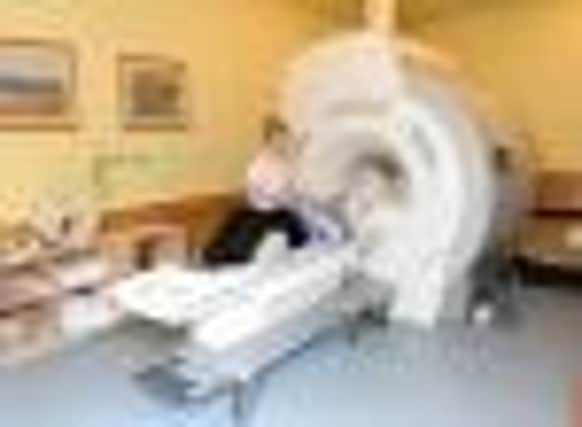MRI scanner to be developed at Aberdeen University


• It is hoped the new scanner will help to develop new drugs for diseases such as Parkinson’s and Alzheimer’s
• The new technology has been named Zero-Field Magnetic Resonance Imaging (ZF-MRI)
Advertisement
Hide AdAdvertisement
Hide AdThe revolutionary new scanning system is being developed by a team of specialists at Aberdeen University which led the world in 1980 with the development on the first full-body MRI scanner, spearheading its widespread use by the medical profession.
The team at Aberdeen University has been awarded a grant of almost £1 million by the Engineering and Physical Sciences Research Council to develop the new scanning technology, known as a Zero-Field Magnetic Resonance Imaging (ZF-MRI)
Professor David Lurie, a medical physicist who is leading the project, explained that ZF-MRI will be a radical departure from standard MRI which takes pictures of the body using a constant and very powerful magnetic field.
The ZF-MRI will take the magnetic field within the scanner – including the Earth’s own magnetic field – very close to zero in order to see disease-related changes in tissue that cannot be seen by a conventional MRI scanner.
He said it was hoped the new scanning technique will allow specialists to “see” disease at an earlier stage. And the team hope the new method may also reveal “biomarkers” - detectable indicators of disease state or progression - which might eventually help pharmaceutical companies to develop new drugs for neurodegenerative diseases such as Parkinson’s and Alzheimer’s, as well as other diseases like cancer and osteoarthritis.
Professor Lurie said: “Neurodegenerative diseases are a serious concern with more than 850,000 cases in the UK, and numbers are expected to double in the next 40 years because of our ageing population.
“There is an urgent need for new drugs that could be used earlier to slow disease progression but none currently exist and one of the major barriers to that is the difficulty of early diagnosis of disease.
“In the case of Parkinson’s, for example, the disease is diagnosed purely from clinical symptoms because imaging methods are not currently available to detect early changes in the brain before the symptoms actually develop.
Advertisement
Hide AdAdvertisement
Hide Ad“New technology like Zero-Field MRI could hopefully allow us to see diseases at an earlier stage. This would also be of great help to drug companies who use what are called biomarkers in the body to measure how a disease is progressing and to monitor if a drug treatment is actually working.”
The research project is a collaboration between university-based researchers in medical physics, radiology, neuroscience and neurology and it is planned that the ZF-MRI will be used together with another MRI technique, pioneered by Professor Lurie’s team, called Fast Field-Cycling MRI (FFC-MRI), which has already led to improvements in the standard scanning of patients.
Prof Lurie continued:” At the moment our focus is on neurodegenerative diseases, but ZF-MRI has the potential to be used in a range of other diseases such as cancer, osteoarthritis, fibrosis and thrombosis. We have already made a start on studying those conditions using our existing FFC-MRI scanners.
“We believe we are the first in the world to be working in this way on ZF-MRI and we are delighted to be continuing to build on the University of Aberdeen’s imaging legacy.”
Dr Lionel Broche, a Research Fellow at the university and another member of the scanning team, said: “Right from the early days of MRI it has been known that the contrast that can be seen between normal and diseased tissue is greater at lower magnetic fields. This is because of the way in which molecules move around in tissues, altering the signals that are detected and used to form the detailed MRI pictures.
“At low magnetic fields the speed of the molecular motion is more closely matched to the frequency of the MRI signals, making the technique more sensitive to changes. ZF-MRI should provide us with exquisite sensitivity to subtle changes in brain tissue, bringing the possibility of early diagnosis.”
A university spokeswoman explained: “The work will span three years and will initially involve researchers modifying the FFC-MRI scanner to allow zero-field measurements to be carried out. They then plan to use ZF-MRI to scan small objects such as bottles containing protein gels to mimic normal and diseased tissues.
“Towards the end of the study the team hope to be able to image some patients with neurodegenerative diseases, in particular Parkinson’s and Alzheimer’s.”